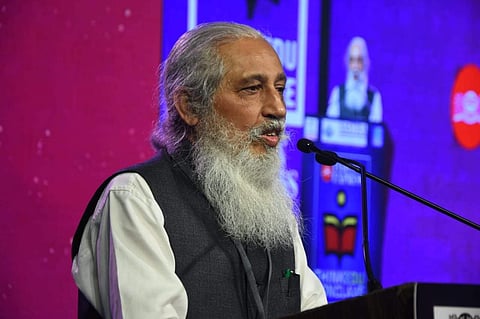

At a time when digital learning was taking baby steps, the pandemic suddenly made it the order of the day, said Anil Sahasrabudhe, Chairman, All India Council for Technical Education (AICTE), talking on the topic 'Learning Online: Crossing the Digital Divide' at the 10th edition of TNIE's ThinkEdu Conclave. Despite having various challenges, including lack of connectivity, affordable devices and data charges, he said that digital learning could help the country achieve the 50 per cent Gross Enrolment Ratio (GER) mentioned in the National Education Policy (NEP), he added.
"NEP also talks about increasing the Gross Enrolment Ratio to 50 per cent. From 0.7 per cent during the independence, it has come to 27 per cent. With conventional teaching methods, it will take at least 50 years to increase it to 50 per cent, this is where digital learning can help. Apart from being affordable, online teaching will also make the teachers become better," he said in his keynote address.
However, the government is already taking steps to bridge this gap, with 2.5 lakh villages being given broadband service. Starting with internet service in Common Service Centres and Village Panchayat Offices, it should be expanded, he noted. Till then, television channels can also be used as an alternative. He added that we should also make sure that devices, including personal computers and laptops, are affordable. The Union Budget also mentions digital universities which could help various institutions to collaborate, he said while speaking to Senior Journalist Kaveree Bamzai.
Talking about remodelling AICTE to digital learning, Sahasrabudhe said that they were offering online courses before the pandemic itself. "There is also the National Education Alliance for Technology (NEAT) which was started 2-3 years ago. Through three levels of verification, we also buy various products from the education technology companies without negotiating the cost. For every four seats, they have to provide one seat free. This free seat is given to the disadvantaged sections of the society. So far, 40-50 lakh such seats have been bought," he added.
Pavan Allena of Metamorphosis Edu, who was also on the panel, said that the pandemic changed the notion that entrepreneurship can be taught only in person. "We teach entrepreneurship to kids from Class VI. We used to send tutors to schools to do that. Since we shifted online due to the pandemic, our pool of tutors have grown to 45 across 14 states and we received admissions from several places where our company was not known," he said and urged the government to start an undergraduate course for entrepreneurship.
Pulkit Jain of Vedantu advocated that children require inspiration and motivation, in addition to being given content. He asked Sahasrabudhe if there was any way that multiple bodies like the government, non-profit organisations and private players can come together to create an ecosystem to teach the children instead of just propagating content. This was followed by Phalgun Kompalli of UpGrad asking how educational technology companies can work with the governments to bridge the digital gap and also help the educational institutions with the change.
Answering their questions, Sahasrabudhe said that the National Educational Technology Forum (NETF) is working towards a report to facilitate such a public-private partnership.
ThinkEdu 2022 is the grand tenth edition of what has consistently been India's biggest education conclave for a decade now. March 8 and 9 will see some stalwarts of India's academic, economic and political ecosystems bring ideas, ideologies and reflections on the past, present and future of India's education system. The sessions will be viewed by a live audience, in addition to the 2,750 registered users on the conclave's digital space. Over the last nine years, the conclave has seen some true stalwart thinkers such as former presidents Dr APJ Abdul Kalam and Dr Pranab Mukherjee, MPs Jairam Ramesh, Smriti Irani, former CM of Jammu and Kashmir Farooq Abdullah, NITI Aayog's CEO Amitabh Kant and spiritual guide Sadhguru.
